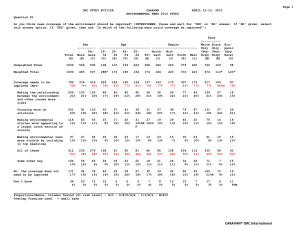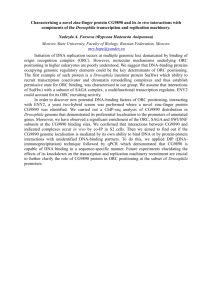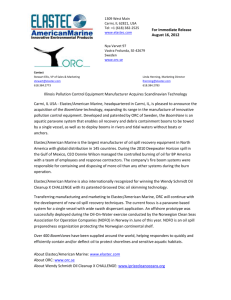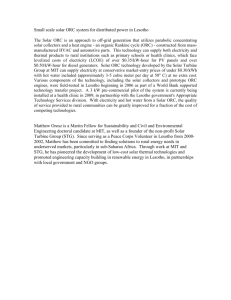OHIO PRODUCTS: • Pseudoephedrine (PSE) or Ephedrine (EPH
advertisement
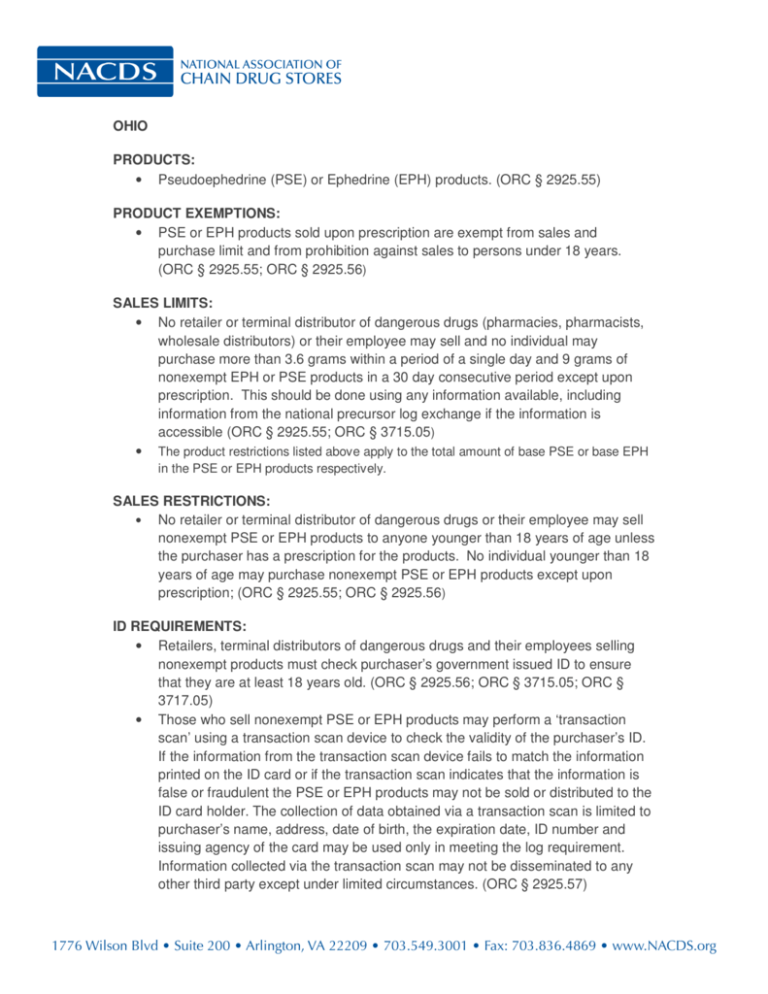
OHIO PRODUCTS: • Pseudoephedrine (PSE) or Ephedrine (EPH) products. (ORC § 2925.55) PRODUCT EXEMPTIONS: • PSE or EPH products sold upon prescription are exempt from sales and purchase limit and from prohibition against sales to persons under 18 years. (ORC § 2925.55; ORC § 2925.56) SALES LIMITS: • No retailer or terminal distributor of dangerous drugs (pharmacies, pharmacists, wholesale distributors) or their employee may sell and no individual may purchase more than 3.6 grams within a period of a single day and 9 grams of nonexempt EPH or PSE products in a 30 day consecutive period except upon prescription. This should be done using any information available, including information from the national precursor log exchange if the information is accessible (ORC § 2925.55; ORC § 3715.05) • The product restrictions listed above apply to the total amount of base PSE or base EPH in the PSE or EPH products respectively. SALES RESTRICTIONS: • No retailer or terminal distributor of dangerous drugs or their employee may sell nonexempt PSE or EPH products to anyone younger than 18 years of age unless the purchaser has a prescription for the products. No individual younger than 18 years of age may purchase nonexempt PSE or EPH products except upon prescription; (ORC § 2925.55; ORC § 2925.56) ID REQUIREMENTS: • Retailers, terminal distributors of dangerous drugs and their employees selling nonexempt products must check purchaser’s government issued ID to ensure that they are at least 18 years old. (ORC § 2925.56; ORC § 3715.05; ORC § 3717.05) • Those who sell nonexempt PSE or EPH products may perform a ‘transaction scan’ using a transaction scan device to check the validity of the purchaser’s ID. If the information from the transaction scan device fails to match the information printed on the ID card or if the transaction scan indicates that the information is false or fraudulent the PSE or EPH products may not be sold or distributed to the ID card holder. The collection of data obtained via a transaction scan is limited to purchaser’s name, address, date of birth, the expiration date, ID number and issuing agency of the card may be used only in meeting the log requirement. Information collected via the transaction scan may not be disseminated to any other third party except under limited circumstances. (ORC § 2925.57) RECORDKEEPING REQUIREMENTS: • A retailer or terminal distributor of dangerous drugs that sells, offers to sell, holds for sale, delivers, or otherwise provides a pseudoephedrine product or ephedrine product to the public shall maintain a log book in a tangible format, in an electronic format. Each individual who must sign their name in the log book; the retailer or terminal distributor must ensure that the signature matches the government-issued identification card; and the information in the log book must be retained one year after the date of the last purchase recorded in the log book or as required by federal law. (ORC § 3715.051) • Information in the logbook may not be used or disclosed except in response to court order or subpoena; in response to a request from law enforcement to be used for law enforcement purposes; or for purposes of complying with requirements in section 3715.052 of the regarding the submission of information to the national precursor log exchange. (ORC § 3715.051) • Provides the national precursor log exchange to submit the information regarding each sale of pseudoephedrine product or ephedrine product including: the purchaser's name and address, the name and quantity of the product purchased, the date and time of purchase, and the type of government-issued identification provided by the purchaser at time of purchase. (ORC § 3715.052) POSTED NOTICE • Retailers and terminal distributors of dangerous drugs must post a sign in a conspicuous location or post on the viewing screen of electronic logbooks and on the cover and each page of paper logbooks (depending upon which format the seller uses to record purchases) that includes the following statement: • "Ohio law prohibits the over-the-counter purchase of a consumer product containing a total amount of base pseudoephedrine or base ephedrine that exceeds either three and six tenths grams in a single day or nine grams within any period of thirty consecutive days. If, without a valid prescription, you purchase a consumer product containing pseudoephedrine or ephedrine, you are required to sign a log book that may be accessible to law enforcement officers and provide a government-issued identification card to verify your identity. Except in limited circumstances, the purchase of more than the permissible amount of a consumer product containing pseudoephedrine or ephedrine, and the purchase by any individual under eighteen years of age of a consumer product containing pseudoephedrine or ephedrine, are subject to criminal prosecution or delinquency proceedings in accordance with Ohio law. Also, the provision of false information concerning an individual's name, age, or other identification for the purpose of acquiring a consumer product containing pseudoephedrine or ephedrine is subject to criminal prosecution or delinquency proceedings in accordance with Ohio law." (ORC § 3715.051) PRODUCT PLACEMENT: • Retailer or terminal distributors of dangerous drugs must take measures to ensure that no member of the public may procure or purchase products without direct assistance from a pharmacist or other authorized employee. (ORC § 3715.05; ORC § 3717.05) PENALTIES: • Whoever violates sales limits are guilty of unlawfully selling a PSE or EPH products – a misdemeanor of the first degree; (ORC § 2925.56) • Whoever violates restrictions on sales of nonexempt PSE or EPH products to minors are guilty of unlawfully selling a PSE or EPH products to a minor – a misdemeanor of the fourth degree; (ORC § 2925.56) • Whoever violates requirement for maintaining log for sales of nonexempt PSE or EPH products are guilty of improper sale of a PSE or EPH product – a misdemeanor of the second degree. (ORC § 2925.56) • Failure to comply with the sales limits qualifies as failing to submit information to the national precursor log exchange, a misdemeanor for which the offender shall be fined not more than one thousand dollars per violation. (ORC § 2925.56) • Whoever violates using the information that derived from a transaction scan or that is permitted to be recorded and maintained, the court may impose upon the offender a civil penalty of up to one thousand dollars for each violation. The clerk of the court shall pay each collected civil penalty to the county treasurer for deposit into the county treasury. (ORC § 2925.57) RETAILER/TERMINAL DISTRIBUTOR LIABILITY EXEMPTION: • A retailer or terminal distributor of dangerous drugs may complete a sale even though the exchange has generated a stop-sale alert if the retailer or terminal distributor of dangerous drugs has a reasonable fear of imminent bodily harm should the sale not be completed. To accommodate such circumstances, the retailer or terminal distributor of dangerous drugs shall ensure that the override function of the exchange has been enabled. (ORC § 3715.052) • Exempts a retailer from participating for any of the following reasons: 1) if they are unable to obtain Internet access; 2) if there is a charge for using the exchange; 3) if there is any fee related to operations or maintenance of the exchange; 3) if the equipment needed to use the exchange is not provided without cost; and 4) if the equipment is not technologically compatible with the retailer's operational system. Authorizes the Attorney General to enter into a contract or memorandum of understanding with the National Association of Drug Diversion. (ORC § 3715.053) • A retailer or terminal distributor of dangerous drugs is not liable in damages in a civil action for injury, death, or loss to person or property resulting from any act or omission in carrying out the duties specified in sections 3715.05, 3715.051, and 3715.052 of the Revised Code regarding the sale of a pseudoephedrine product or ephedrine product, unless the act or omission is negligent or reckless or constitutes willful or wanton misconduct. (ORC § 3715.054) OTHER: • Each retailer, terminal distributor of dangerous drugs, pharmacies, prescribers, and wholesalers that discovers the theft or loss of any PSE or EPH product in an amount of more than 9g per incident of theft or loss must notify the state board of pharmacy by phone immediately and within 30 days follow up with a report in writing. The reports must identify the product stolen or lost, the amount stolen or lost, and the date and time of discovery. Additionally, notice must be given to law enforcement authorities if the theft constitutes a felony. (ORC § 3715.06)
